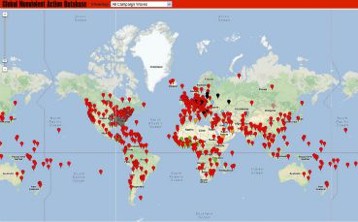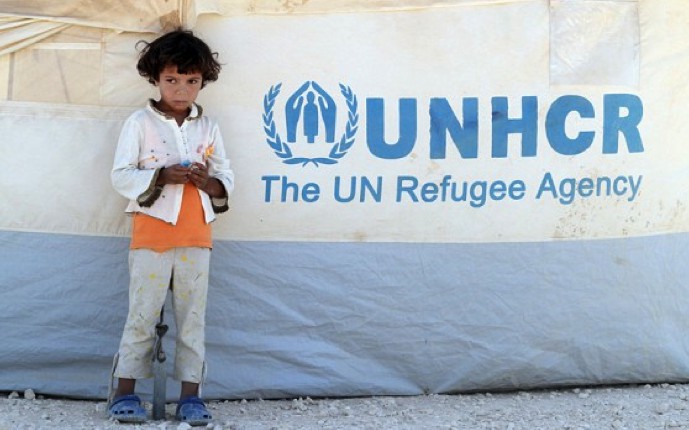Check out all the great Peace and Conflict Studies courses on offer this spring 2017!
Peace and Conflict Studies Courses
Spring 2017
PEAC 003. Crisis Resolution in the Middle East
Eligible for POLS and ISLM credit
This introductory course is designed for students without a background in Peace and Conflict Studies or Middle East Studies. Central questions include: How do we define crises in the contemporary Middle East/North Africa region? How does the nature of the crisis (political, economic, social, and environmental) impact communities differently? How are grassroots actors, civil society institutions, states, and international organizations responding to these challenges in their nation-states and across borders? What transnational networks of solidarity have linked the Middle East to other regions across the globe? For instance, this course will examine the consequences of environmental degradation and escalating food prices on conflict and instability across the region. We will trace the origins of autocratic regimes in the Middle East and social movements calling for rights and reforms on one hand and the rise of fundamentalism and terrorism (i.e. Al-Qaeda and ISIS). Furthermore, the course will explore crises such as contemporary Syria, and how local and international interventions aimed at reversing the marginalization of-and threats against-minority populations (ethnic, religious, gender, sexuality, ability) have come to constitute a realm of crisis management. By understanding crises through the theoretical prism of human security frameworks, we will ascertain the prospects for democratization, development, pluralism, and peace in the region.
Sa’ed Atshan; Tuesdays 1:15-4:00; Kohlberg 116
PEAC 043. Gender, Sexuality and Social Change
Eligible for GSST credit
How has gender emerged as an analytical category? How has sexuality emerged as an analytical category? What role did discourses surrounding gender and sexuality play in the context of Western colonialism in the Global South historically as well as in the context of Western imperialism in the Global South today? How are gender and sexuality-based liberation understood differently around the world? What global social movements have surfaced to codify rights for women and LGBTQ populations? How has the global human rights apparatus shaped the experiences of women and queer communities? What is the relationship between gender and masculinity? What are the promises and limits of homo-nationalism and pink-washing as theoretical frameworks in our understanding of LGBT rights discourses? When considering the relationship between faith and homosexuality, how are religious actors queering theology? How do we define social change with such attention to gender and sexuality? 1 credit.
Sa’ed Atshan; Mondays 1:15-4:00; Science Center 105

PEAC 049. Social Entrepreneurship in Principle and Practice
Amidst market implosions, human conflict, environmental crises, and on-going demise of the welfare state, the need for new, durable organizational forms, committed to social change, is clear. Social entrepreneurship offers a unique model for creative conflict transformation and community problem solving. Using business practices, social enterprises seek to redress social and environmental concerns while generating revenue. Students will learn about the manifestation of social entrepreneurship principles and practice in non-profit, for-profit, and hybrid organizations. Then, students will draft plans for their own social enterprise, thereby garnering a deeper understanding of social enterprise as organizational forms, while also embarking on a journey to explore their own potential as social entrepreneurs. 1 credit.
Denise Crossan, Lang Professor for Social Change; Tuesday/Thursday 8:30-10:30; Lang Center 112
PEAC 071B Research Seminar: Strategy and Nonviolent Struggle
(Cross-listed as SOAN 071B)
This one-credit research seminar involves working and updating the Global Nonviolent Action Database website which can be accessed by activists and scholars worldwide at http://nvdatabase.swarthmore.edu The Global Nonviolent Action Database was built at Swarthmore College and includes cases of “people power” drawn from dozens of countries. The database contains crucial information on campaigns for human rights, democracy, environmental sustainability, economic justice, national/ethnic identity, and peace. Students will be expected to research a series of cases and write them up in two ways: within a template of fields (the database proper) and also as a 2-3 page narrative that describes the unfolding struggle. In addition to research/writing methods, students will also draw theories in the field. Strategic implications for today will be drawn from theory and from what the group learns from the documented cases of wins and losses experienced by people’s struggles. 1 credit. Writing course. Enrollment limited to 12 students.
Lee Smithey; Thursday 1:15-4:00; Lang Center 106
PEAC 103. Humanitarianism: Anthropological Approaches
(Cross-listed with SOAN 103)
This honors 2-credit seminar will introduce students to the most salient theoretical debates among anthropologists on humanitarian intervention around the world. We will also examine a range of case studies, from the birth of Western Christian humanitarian missions in colonial contexts to humanitarian interventions (e.g. military, food-based assistance, natural disaster relief, post-conflict reconstruction) today. The geographic scope of this seminar will encompass North America, South America, the Caribbean, Europe, sub-Saharan Africa, the Middle East/North Africa, East Asia, and South Asia. We will consider, for instance, how anthropologists have examined relief efforts in the wake of Hurricane Katrina in New Orleans. What social science scholarship has been produced on mental health interventions after political and natural crises in Haiti? How are victims of torture at the hands of the Indian military supported by international organizations in Kashmir? What is the nature of global Islamic humanitarianism today? How are local national staff employed by international organizations shaping humanitarian approaches to gender-based violence in Colombia? These are among the many questions we will address over the course of the semester.
Sa’ed Atshan; Wednesdays 1:15-4:00; Kohlberg 226




